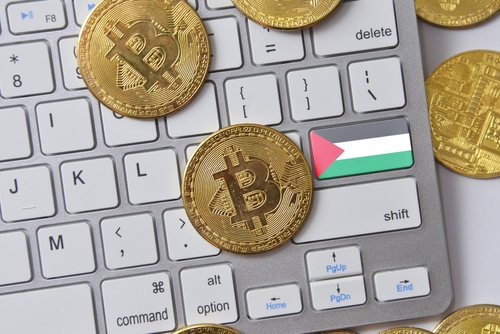ALBAWABA- In our world cryptocurrencies have emerged as a powerful tool that can bring about revolutionary changes in various industries. One sector that stands to benefit from this technology is donations, particularly in regions like Palestine that face ongoing conflicts and humanitarian crises. This article delves into the ways in which cryptocurrencies can play a role in transforming the donation process for Palestine providing an efficient, transparent, and secure channel for individuals and organizations looking to support those in need.
The Existing Challenges with Charitable Donations to Palestine

Source: Shutterstock
Donating to a conflict-ridden region like Palestine has traditionally posed challenges. Several obstacles hinder the effectiveness of donation methods; like the following:
1. Lack of Transparency:
Traditional charitable donations often suffer from a lack of transparency leaving donors about where their funds are ultimately directed and raising doubts about the impact of their contributions.
2. Transaction Costs:
International money transfers can involve fees and lengthy processing times thereby reducing the value of the actual donation itself.
3. Political and Banking Obstacles:
Financial institutions and governments sometimes impose restrictions, on funds intended for conflict zones making it difficult to ensure that donations reach their intended recipients.
4. Bureaucracy and Corruption:
Donations made through channels can sometimes become entangled in inefficiencies or in certain instances even be redirected due, to corrupt practices.
How cryptocurrency can revolutionize donation to Palestine
Cryptocurrencies have the potential to address these challenges and revolutionize the process of donating to Palestine in the following ways:
Transparency and Accountability
Blockchain is a transparent and immutable ledger that facilitates cryptocurrency. The record of each transaction is available in public domain with assurance that funds go to the cause they were meant for. This provides a level of transparency that leads to better accountability in the charitable arena.
Low Transaction Costs
Transfers for cryptocurrencies are incredibly cheap when compared to conventional financial environments. This assures donors that a large part of their funds will actually reach the intended beneficiaries instead of paying for the transaction fee cost.
Borderless and Immediate
Cryptocurrencies do not operate using standard time, as they have no jurisdictional boundaries. This ensures that the aid money is channeled immediately to direct beneficiaries in a way that bypasses bureaucracies associated with conventional handouts.
Financial Inclusion
The cryptocurrency donations, however, can help empower the underbanked and unbanked population of Palestine. Most people living in areas of crisis never had a chance to visit conventional banks. In such case, cryptocurrencies could be the answer to their need for financial support.
Decentralization
Decentralized cryptocurrencies like bitcoin and ethereum are not governed by any one organization or government, thereby minimizing chances of politicization or financial sanctions which could disrupt traditional forms of donations.
Case Studies in Cryptocurrency and Bitcoin donations for Palestines
A lot of companies and persons have already realized that cryptocurrency can be used as an assistance tool to Palestine. Some noteworthy examples include:
GiveCrypto: In Palestine and other conflict zones, this non profit organization has delivered cryptocurrencies to the affected persons directly. Block-chain has been able to empower them with much needed succor.
Palestine Children's Relief Fund (PCRF): Bitcoin donation into PCRF helps the children suffering in Palestine get a chance of getting well through medication.
Baitulmaal: Baitulmaal is a humanitarian organization dedicated to providing critical assistance to those in need across the globe, particularly in regions facing adversity such as Afghanistan, Bangladesh, Lebanon, Palestine, Syria, and Yemen. They also focus on uplifting underprivileged communities in Jordan, Kenya, Pakistan, and Somalia by offering support to improve their living conditions.
Challenges and Considerations
While the potential for cryptocurrencies to revolutionize donations to Palestine is promising, there are several important considerations:
Volatility: The price volatility associated with cryptocurrencies. It might be required to convert any received crypto into the local currency as soon as possible in order to avoid this risk.
Education: Donors and their beneficiaries must also be informed about the benefits accrued from the utilization of cryptocurrencies for charitable purposes.
Regulatory Compliance: It is crucial to maneuver the jurisdictional terrain concerning cryptocurrencies. That involves adherence to AML and KYC policies.
Technical Infrastructure: The problem of setting up infrastructure for doing cryptocurrency deals in places with little or no technological coverage will most likely arise in such areas.
Cryptocurrencies also can transform the landscape for charity donation to Palestine with more transparency, lower transaction cost, and direct assistance to the recipients. Through utilizing the distributed character of blockchain technology, the charitable sector may be able to bypass the hindrances of established donation techniques and contribute significantly in post-conflict zones. Still, with continued efforts and rise in utilization of cryptocurrency in Palestinian relief charities, the future looks bright for this new way of assistance for Palestinians.







